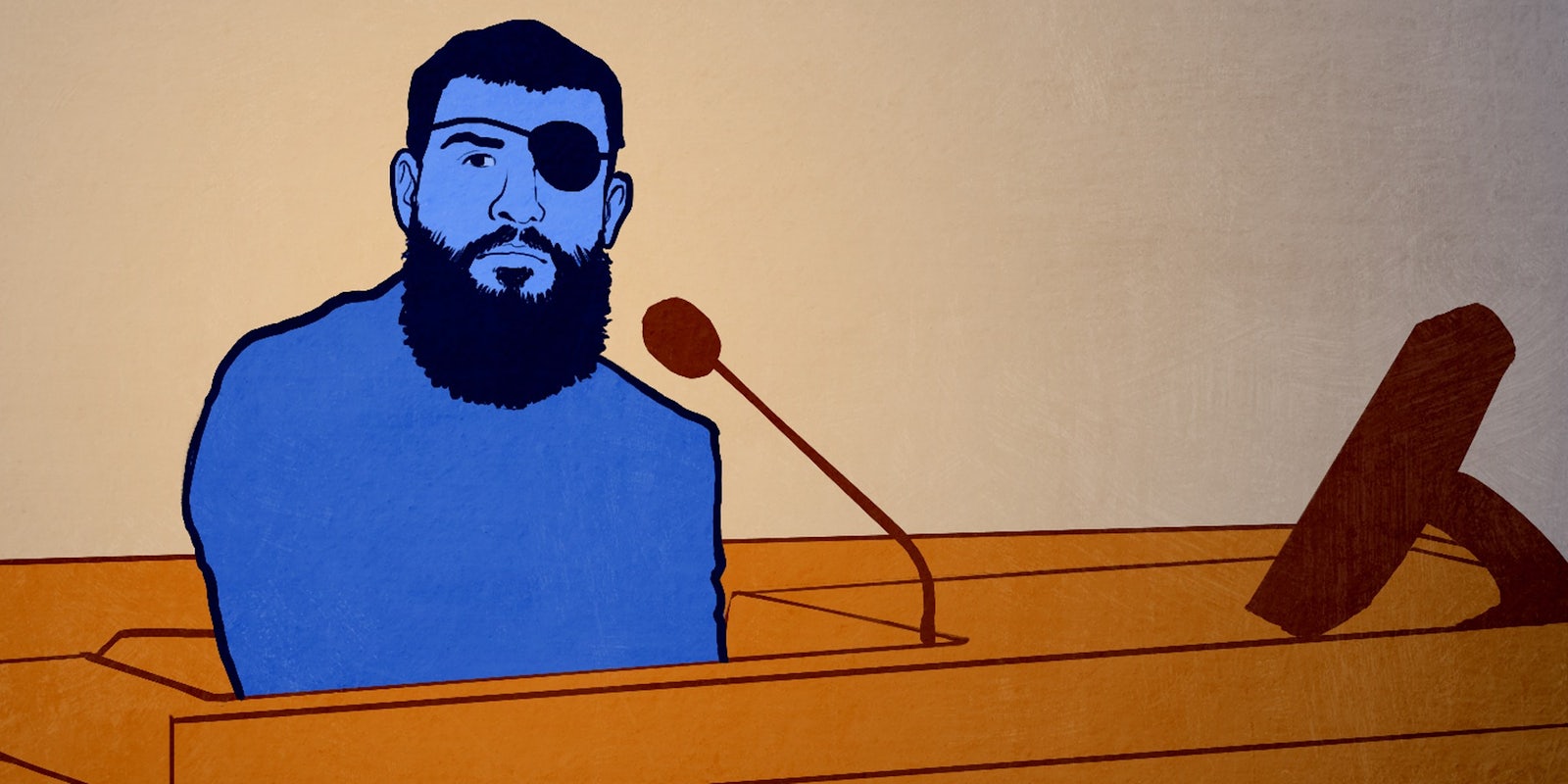Two of Guantánamo Bay’s highest-value prisoners and a former prison camp commander were called as witnesses late this week in the ongoing 9/11 war crimes case. The witnesses weren’t being asked to testify about the terrorist attack that killed nearly 3,000 people, but rather to contradict or corroborate accused 9/11 collaborator Ramzi Bin al Shibh’s claim that the military is preventing him from sleeping by pumping noises into cells at Camp 7, the facility’s most top-secret unit, despite the judge’s order to stop (if it was in fact happening).
The prosecution claims that Bin al Shibh is making the allegations up. Either way, the witnesses’ questioning is part of a single motion among hundreds that will be addressed before an eventual trial. A date has yet to be set in the capital case against Bin al Shibh and four alleged fellow co-conspirators, but defense lawyers call a 2020 date “optimistic.”
The war court rounded out a week of hearings on Friday by calling a former Camp 7 commander to testify about the alleged noises. The commander said that he was familiar with Bin al Shibh’s allegations when he took over the post and searched for the source. The only possible origin he could find, other than routine repairs, which he says detainees were notified of, was plumbing pipes. He testified that staff complied with the judge’s order to cease any noise-making, if they were in fact doing so. His overall message: There is no multiyear conspiracy among alternating prison staff to make noises.
Guleed Hassan Dourad, a Camp 7 prisoner, testified differently on Thursday, wearing a black-checked keffiyeh, white khamis, and a trim black beard. He first entered CIA black sites in 2004, allegedly for targeting U.S. forces in Djibouti, before eventually being sent to Gitmo in 2006. He told the court that his approach to the witness stand marked the first time since his arrival that he’s walked without shackles.
The 43-year-old Somali prisoner lives in the same Camp 7 block as Bin al Shibh and claims that he, too, has been hearing sounds, “every day, every minute, every hour, every year,” since 2009. The noises allegedly include hammering on the roof, as well as vibrations coming from the floor. “We have mental torture in Camp 7. In black site we had physical…,” he said, before being cut off by the prosecution and being told to only discuss his time at Gitmo.
Dourad says that his cell is situated near Bin al Shibh’s, enabling the two to speak when guards open cell door slats. Like Bin al Shibh, Dourad believes that the noises and vibrations he’s experienced are punishment stemming from his refusal to “cooperate” while in CIA custody. This belief is rooted in Dourad’s understanding that the sounds cannot be heard in all of Camp 7’s cells. He added that Abu Zubaydah, whom he calls the “camp leader” and whom he discusses camp problems with in the “media room” because their cells are not close, can also hear the noises.
When the prosecution took over Dourad’s questioning, they inquired about the information the U.S. government has on record about him. It was an apparent move to discredit Dourad’s testimony about the noises. Here’s a livetweeted snippet from the Miami Herald’s Carol Rosenberg who was observing the proceedings in a satellite room:
Ryan: Did you train at Khaldan camp? Guleed: No. Ryan: At any al-Qaida camp? Guleed: No. Ryan: You’re lying.
— Carol Rosenberg (@carolrosenberg) June 2, 2016
During Dourad’s short testimony, government censors cut off the observers’ feed twice, presumably because classified evidence was being discussed.
Fellow Camp 7 detainee Abu Zubaydah—once thought to be a high-level Al Qaeda recruiter, a theory that was later discredited in the Senate’s so-called CIA “torture report”—was meant to testify after Dourad on Thursday. In fact, he made it up to the war court’s doors before lawyers postponed his testimony until at least July over the possibility of incriminating questioning.
War court observers highly anticipated Zubaydah’s appearance because he hasn’t been publicly seen in nearly 14 years. CIA officers suggested soon after his 2002 capture that he “should remain incommunicado for the remainder of his life,” as the Senate report revealed. “I would like my client to see the light of day in front of a microphone,” Zubaydah attorney Navy Cmdr. Patrick Flor told the Miami Herald following the hearing. “He’ll no longer be forgotten.”
Former FBI agent Ali Soufan, who first interrogated Zubaydah, also told the Miami Herald in the lead-up to the testimony that the captive represents “the A to Z” of where the nation went wrong. “In a way, it was the original sin that led to the institutionalization of the so-called Enhanced Interrogation Techniques,” he said.
The CIA subjected Zubaydah to 83 rounds of waterboarding, deprived him of sleep, kept him naked, and confined him to a black box, none of which provided intelligence beyond what Soufan gleaned through traditional interrogation methods, according to the Senate’s report. “I do not recall a case during the war on terror years that contained more elements of deceit and exaggerations aimed to promote the ill-conceived torture program like the case of Abu Zubaydah,” Soufan said.
Though the government denies it, Bin al Shibh’s testimony, as well as Dourad’s, suggest that such ill-treatment may be ongoing.


